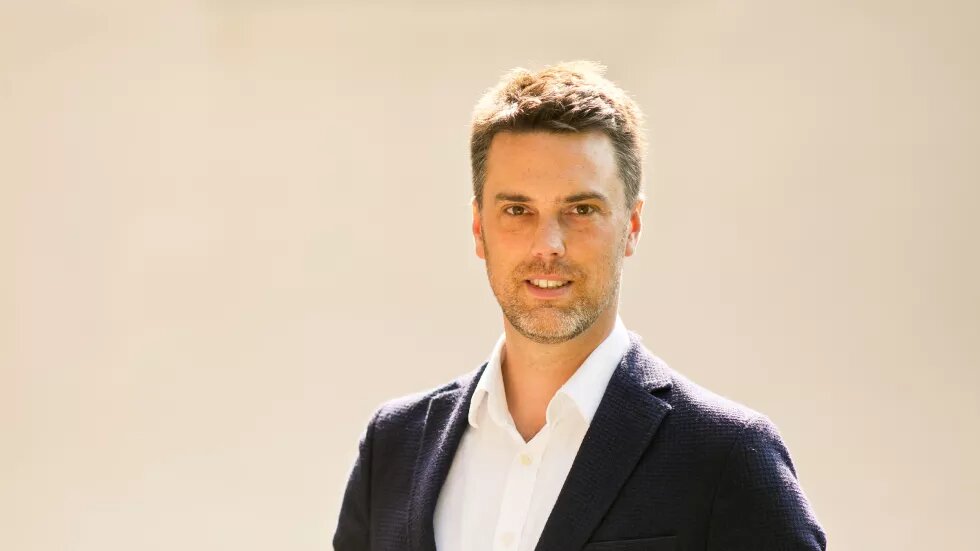Robin Wagener, member of the German Bundestag, became the Federal Foreign Office’s coordinator for inter-societal co-operation with the South Caucasus, the Republic of Moldova and Central Asia on 1 March 2023. In this conversation, we are going to be talking about his new task and the condition of civil societies in the South Caucasus.

Sonja Schiffers: Robin, you took office on 1 March. How do you look at your new role? What are your goals with regard to the inter-societal co-operation between Germany and the South Caucasus?
Robin Wagener: My work will be focussed on exchanging views with and collaborating with civil society stakeholders. I believe that a lively civil society is the backbone of every single democracy. It is what guarantees variety and a plurality of opinions. That’s why I look forward to the many conversations I will be having with people who work - for example - for climate and environmental protection, for women’s and human rights, for independent media or against corruption and disinformation.
I would like to contribute to the strengthening and the expansion of the inter-governmental and inter-society partnerships between Germany and the South Caucasus. I therefore consider myself to be a contact person and mouthpiece for civil society issues. I would like to listen, understand problems, take them seriously and provide concrete assistance wherever possible.
What role does this inter-societal co-operation play in democratisation processes and the convergence between the South Caucasus and the European Union? What can it do that government collaboration cannot do?
A country is always much more than the sum of its state institutions. Close political collaboration between governments and parliaments is important. No question. But a critical civil society and independent media are just as important for a successful process of reform and transformation. Civil society stakeholders and critical media often call things as they are and put pressure on the political sector. This applies to EU member states, as well as countries that want to become members.
Based on my experiences with Ukraine, I know that civil society groups are able to leverage their technical expertise, advice and continuous monitoring capabilities to directly and indirectly participate in the EU accession process in a variety of ways. That’s why I’m convinced that the European way can only serve as an engine for reform and transformation if the political, economic and civil society sectors work together.
At the same time, formats for inter-societal co-operation offer an opportunity to learn from the specific experiences of other regions and local stakeholders.
What do you consider to be the biggest challenges for civil society in the three countries of the South Caucasus, and for inter-societal co-operation with Germany?
The three countries of the South Caucasus are very different – not least because of their respective historical, institutional and political circumstances – and naturally require individual consideration and approaches. However, what applies to all three of them is that the free space for the activities of civil society stakeholders should be preserved and expanded further. Armenia, Azerbaijan and Georgia are participating in the EU’s Eastern Partnership, while Georgia has EU membership prospects. In this respect, all three countries have come down on the side of collaboration with and commitment to Europe, even though their speeds and prospects are different. With regard to the European path, a robust, self-aware and critical civil society and independent media constitute a basic requirement for a free and stable community. This was also emphasised by foreign minister Annalena Baerbock during her visit to Georgia on 24 March.
Two draft laws on the ‘transparency of foreign influence’ and the ‘registration of foreign agents’ were recently discussed in the Georgian parliament. They were withdrawn after mass protests and international pressure. How do you assess these developments? What were your impressions of the protests, especially with regard to the youth and their significance for Georgia’s European path?
I was deeply impressed by how many people – especially young people as well – took to the streets and clearly declared their will for democracy, the rule of law and human rights. We know from surveys that more than 80% of Georgians are speaking out in favour of their country’s accession to the EU. We now have impressive evidence of how they are vocally making Georgian politicians aware of their vision about the future of the country. The Georgians have also shown that they stand above the trenches of their strongly-polarised domestic politics, and are calling for all political forces to work together for the good of the country. That was a clear wake-up call – for both the government and the opposition. I hope it was heard. Above all, I hope it will be respected.
Many partners of the Heinrich Boell Foundation fear that the withdrawal of the laws on ‘foreign agents’ is just a play for time, and that the intimidation and defamation of civil society will continue in the run-up to 2024’s parliamentary elections. What can Germany and the EU do to rule out the presence of a ‘shrinking space’ in Georgia and preserve the sphere of action for civil society?
The fact is that the laws on ‘foreign agents’ are incompatible with the EU’s values and standards, and would have blocked Georgia’s path into the EU. The independent work of NGOs is an important key element for a democratic country that empowers its citizens to speak up for social issues and network internationally, especially when it comes to human rights, climate protection and other international obligations. Stigmatising this is not compatible with European ideals. It all comes down to a joint growth of democratic societies, especially if the situation involves governments that are negotiating accession to the EU. The voices of civil society should therefore be considered more robustly than they have been in the past, even when it comes to the EU accession process.
I trust that the government and the opposition have taken heed of the people’s clear desire to work together constructively in favour of the country’s European future.
On the other hand, what can German civil society learn from the civil societies of Armenia, Azerbaijan and Georgia?
The development of these three countries since they regained independence just three decades ago can be said to be due to their active commitment to civil society. I am very impressed by the dedication, creativity and readiness for self-sacrifice that the activists in the South Caucasus are displaying in their quest for a better future for their countries. Germany has long-established civil society structures. There are tried and tested formats for cooperation with state institutions and participation in important social and political processes. If you, as a German, look at the situation in countries like Armenia, Azerbaijan and yes, also Georgia, you realise that many things that we take for granted are not self-evident, and often still have to be fought for.
Robin, one of your tasks is to maintain contacts with the democratic and government-critical Belarusian and Russian civil society in exile. What opportunities and risks do you see for inter-societal co-operation between the exiles and the recipient countries, especially Georgia and Armenia, which have taken in tens of thousands?
It is important that we continue to stand by those courageous people from Belarus and Russia who have often spent years in their countries fighting for human rights, for democracy and thus for peaceful coexistence in Europe. That’s exactly why they’re now being persecuted. We have made it possible for many of these partners to come to Germany. However, a big challenge also lies in the neighbouring countries, which have taken in a particularly large number of those who have fled. We should co-operate even more closely in this regard. We also have aid programmes for this purpose. Whether in Germany, Poland, Armenia or Georgia, we can thus show that we as democrats stick together, and that there can be good prospects for Belarus and Russia again if they are based on democracy and human rights, on respect for international law and responsibility for war crimes.
Final question: When will you be visiting us in the South Caucasus?
That’s a very good question, and a very important one. I would say as soon as possible, because on-the-ground visits show how important the European future of this region is to us. I’m very happy about the fact that foreign minister Annalena Baerbock was carrying a clear message when she was in Tbilisi at the end of March: Germany stands by Georgia’s European outlook. She was deeply moved by the strength of the young generation who want to shape the future of their country and made it clear that respect for democratic standards is non-negotiable. In May 2023, the EU Committee of the German Bundestag will travel to Georgia, followed by visits by individual parliamentarians who closely follow developments in the South Caucasus.
I am planning to travel to the region in early summer and autumn, and am very much looking forward to getting to know and exchanging ideas with our political partners and civil society on the ground.
Thank you for the interview, Robin!
This interview was conducted by Dr. Sonja Katharina Schiffers, director of the regional office of the Heinrich Boell Foundation in the South Caucasus.

